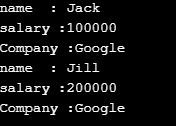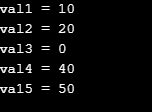
Instanzen im Java-Programm werden immer dann erstellt, wenn ein Objekt in einer Klasse oder Funktion aufgerufen wird, die eine Variable verwendet, um bei jedem Aufruf eines Objekts eine Speichereinheit zuzuweisen und eine Instanz zu erstellen. Alle an den Instanzen durchgeführten Änderungen oder Vorgänge werden automatisch in der Instanzvariablen und der entsprechenden Speichereinheit widergespiegelt. Diese Art von Variablen wird von mehreren Datentypen unterstützt, nämlich int, char, long, short, boolean, float, double, byte und object.
Syntax:
Starten Sie Ihren kostenlosen Softwareentwicklungskurs
Webentwicklung, Programmiersprachen, Softwaretests und andere
<datatype> <variable_name>; <datatype> <variable_name> = <initializing_value>;
Es gibt hauptsächlich 3 Arten von Variablen:
Instanzvariablen werden in einer Klasse deklariert/definiert, jedoch außerhalb der Konstruktoren, Methoden und Blöcke. Instanzvariablen werden so genannt, weil sie instanzspezifisch (objektspezifisch) sind und nicht von mehreren Instanzen (Objekten) gemeinsam genutzt werden und Änderungen, die an Variablen einer bestimmten Instanz vorgenommen werden, sich nicht auf andere auswirken. Wenn einem Objekt in einem Heap Speicher zugewiesen wird, wird für jede Instanzvariable ein Slot erstellt. Instanzvariablen eines Objekts werden erstellt, wenn das Objekt mit „new“ erstellt wird, und werden zerstört, wenn das Objekt zerstört wird. Objekte nutzen sie, um die Zustände zu bewahren.
Syntax:
public class Employee {
public String Name; // instance variable with public Access.
private int salary ; // instance variable with private access.
public static String company; // not an instance variable as it is Static and the value it holds is
// not instance but class specific.
}Instanzvariablen haben Standardwerte; Daher können sie im Gegensatz zu lokalen Variablen ohne Initialisierung deklariert werden. Die Standardwerte für die Variablen hängen von ihren Datentypen ab.
| Datatype | Default Value |
| boolean | false |
| byte | 0 |
| short | 0 |
| int | 0 |
| long | 0L |
| char | u0000 |
| float | 0.0f |
| double | 0.0d |
| Object | null |
Objectreference.variable_name
Examples of the instance variable in java are given below:
Code:
import java.io.*;
public class Employee {
// this instance variable can be accessed any child class since it is public.
public String Name;
// Since salary is a private variable, it is visible in this class only.
private int salary;
// static variable is same among the instances
public static String company;
// The name variable is initialized in the constructor
public Employee (String eName) {
Name = eName;
}
public void setSalary(int eSal) {
salary = eSal;
}
public void printEmp() {
System.out.println("name : " + Name );
System.out.println("salary :" + salary);
System.out.println("Company :" + Employee.company);
}
public static void main(String args[]) {
Employee.company = "Google";
Employee employee_one = new Employee("Jack");
employee_one .setSalary(100000);
employee_one .printEmp();
Employee employee_two = new Employee("Jill");
employee_two .setSalary(200000);
employee_two .printEmp();
}
}Output:

In the above example, we can see the difference between instance variables and static variables. We have created two objects for employees. The name and salary of the objects are different, but the company is the same for both. This is because it is a static variable and the rest are instance variables.
By changing the line “private int salary; “ in the above code to “ private final int salary = 500;”. We’re changing the behavior of the variable. Since we’re trying to modify a final variable, the compiler throws the following error.
Output:

Code:
import java.io.*;
public class DefaultValues {
boolean val1;
double val2;
float val3;
int val4;
long val5;
String val6;
public static void main(String[] args) {
System.out.println("Default values are :");
DefaultValues d = new DefaultValues();
System.out.println("Val1 = " + d.val1);
System.out.println("Val2 = " + d.val2);
System.out.println("Val3 = " + d.val3);
System.out.println("Val4 = " + d.val4);
System.out.println("Val5 = " + d.val5);
System.out.println("Val6 = " + d.val6);
}
}The above code snippet on execution results in the below output. As mentioned earlier, instance variables have default values if they are not initialized while declaring. This program prints the default values of all the data types.
Output:

Code:
import java.io.*;
public class Test implements Serializable
{
// Normal variables
int val1 = 10;
int val2 = 20;
// Transient variables
transient int val3 = 30;
// Use of transient has no impact here
transient static int val4 = 40;
transient final int val5 = 50;
public static void main(String[] args) throws Exception
{
Test input = new Test();
// serialization
FileOutputStream fos = new FileOutputStream("abc.txt");
ObjectOutputStream oos = new ObjectOutputStream(fos);
oos.writeObject(input);
// de-serialization
FileInputStream fis = new FileInputStream("abc.txt");
ObjectInputStream ois = new ObjectInputStream(fis);
Test output = (Test)ois.readObject();
System.out.println("val1 = " + output.val1);
System.out.println("val2 = " + output.val2);
System.out.println("val3 = " + output.val3);
System.out.println("val4 = " + output.val4);
System.out.println("va15 = " + output.val5);
}
}Executing the above program results in the below-given output. variable val3 is declared transient, so its value was not stored into the byte stream when the Test object was serialized.whereas val4 and val5 are not instance variables because they violate the rules of instance variables. Hence their states remain unaffected.
Output:

Das obige ist der detaillierte Inhalt vonInstanzvariable in Java. Für weitere Informationen folgen Sie bitte anderen verwandten Artikeln auf der PHP chinesischen Website!




